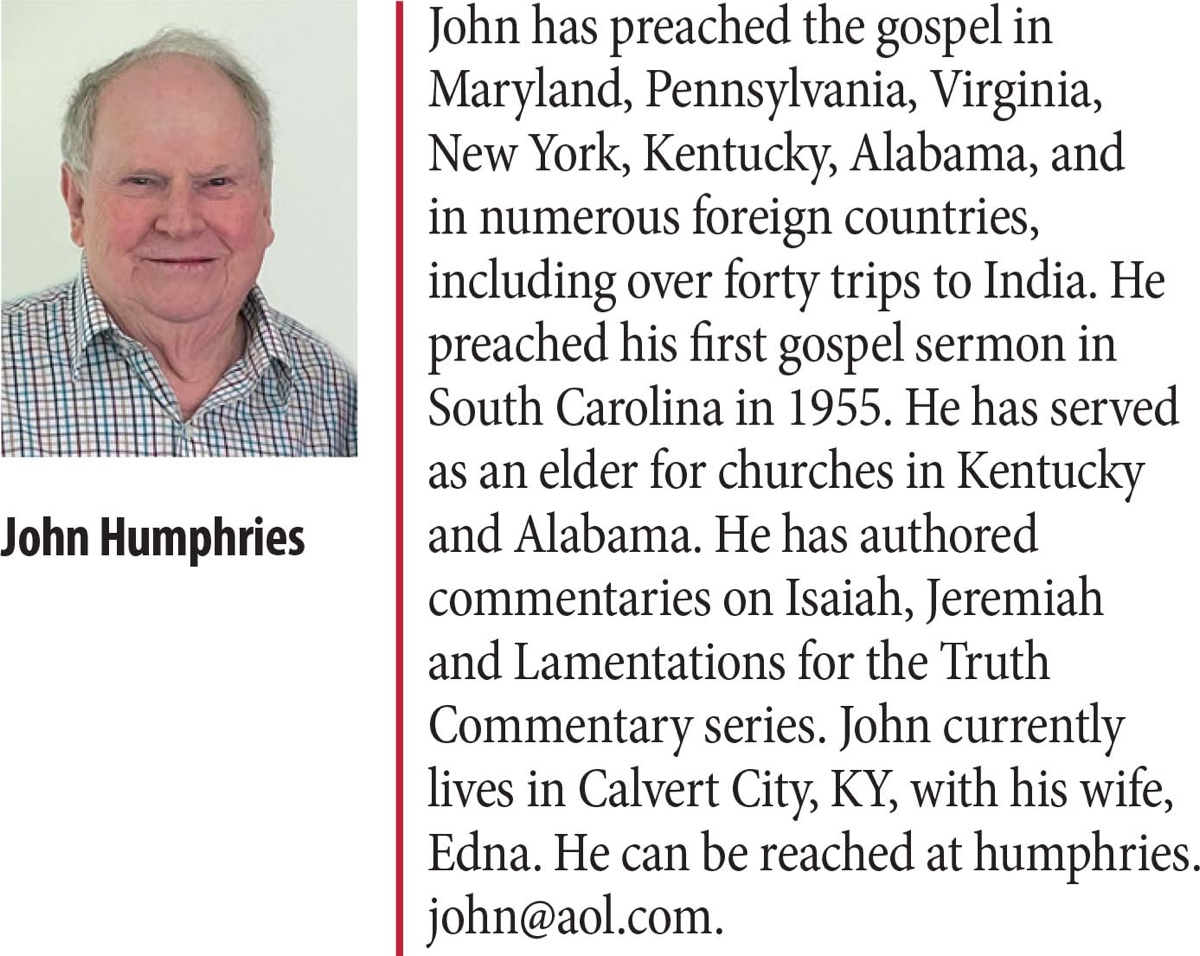by John Humphries
Synopsis: In this issue, brother Humphries begins a new series, in which he shares his experiences from a lifetime of preaching—offering observations on the challenges that evangelists face in youth, maturity, and old age.
A young man may have it in his heart from an early age to preach the gospel. Others may make that decision in their teens or a little later. No matter the age, it is a good, worthy work for a young man to desire to proclaim the unsearchable riches of Christ to a lost and dying world.
In addition to the desire, there is the necessity of studying the Scriptures, preparing a lesson, and then getting up before people and presenting the lesson (practice, practice, practice). Often young men seek an older, experienced, and trusted preacher (or more than one) for guidance (2 Tim. 2:2). Some young men go off to a school operated by brethren to gain knowledge. Others attend technical school, or some university, in order to learn how to “make tents” (Acts 18:1-4; 20:34) so that they can support themselves and preach where adequate financial support is not available. Many young men take advantage of training programs that some churches provide, where a prospective evangelist may work with an older, experienced preacher (and usually a good eldership) in order to gain knowledge and experience. In other words, one must make adequate preparation to preach the gospel (1 Tim. 4:15-16; 2 Tim. 2:15).
Many young men have said, “I love to preach.” It certainly is good to love what one is doing, yet let us go a little further into this motivation to preach the gospel of Christ. Love for preaching ought to be based upon a deep love for God, people, and God’s word (Matt. 22:34-40; Pss. 119:47, 48, 97). A teacher, many years ago, stressed the importance of developing a “love of learning” in the heart. “Love of learning” is an oft-repeated phrase that lingers in the memory. Love for God, one’s neighbor, and the word of God must lead one to develop this “love of learning” in order to grow spiritually and also have something to share with others (i.e., preach).
Out of this deep love, a man should “gird up the loins of (his) mind” and proclaim the unchanging and everlasting gospel that first echoed throughout the city of Jerusalem two thousand years ago, thrilling the hearts of men and women, and subsequently spreading throughout Judea, Samaria, and the entire Mediterranean world. Preach the word in a manner that is sound and true, without addition, subtraction, or change of any kind. Preach it because of love for the truth and hatred of every false way. Preach it without fear or favor of any man, but humbly in the fear of the Lord. Preach it with long-suffering from the depths of one’s heart and with all the fervor and zeal that one can muster. Preach it because one is afraid not to preach it. Preach it in such a way that the highly learned will know the truth, and that even the most unlearned can understand the simple but profound message of the cross. Preach it when it is in season and proclaim it fearlessly when it is out of season. Preach it as an alert watchman on the wall who must warn the people concerning the spiritual dangers of the world. Preach it in love for the Lord and with unfeigned love for the lost souls of all humanity.
Preach the gospel, not to tear down or destroy any good, but to build up and edify the spirits of all who have ears to hear. Preach as though the message you present is the last opportunity that you have to help some wayward traveler find their way and walk with the Lord. Preach, not to seek praise and approbation for one’s self, but to magnify and glorify the precious name of the Lord. Preach only from the book that comes from God’s hand. Stay away from the philosophies and doctrines of men. From the book of God, preach what is needed, to whom it is needed, and when it is needed. Finally, preach the truth with the fullest of confidence that the word of God contains the answer to any (and all) spiritual problems that impact troubled humanity.
The prophet Jeremiah faced opposition to the truth that he was proclaiming to Israel. It will eventually be the same with the young evangelist if he boldly preaches the truth (2 Tim. 3:10-14; 4:5). Jeremiah became discouraged and depressed because of the derision and verbal abuse that was heaped upon him (Jer. 20:7-8, 14-18). The prophet even suffered physical abuse (Jer. 20:1-2; 38:9). He was tempted to give up and quit preaching, but the truth was in his heart “like a burning fire” and he had to proclaim it to Israel, whether they would receive it or not (Jer. 20:9; cf. Ezek. 3:7-9)!
This passage suggests several thoughts concerning preachers and preaching. There are some that consider preaching as a select career. Because the church is paying them a salary, they are obligated to present a sermon or two on Sunday, etc. They have to “get up a lesson” and say something because they are hired to fulfill a responsibility. They may possess fine speaking skills and can impress an audience, but basically they are a hireling. Then there are others that are studious and will thoroughly research a subject or passage and have good material to present in their lessons. They love to do research, and usually have something edifying to say to the people, but without deep, heartfelt enthusiasm. In contrast, Jeremiah indicates that there is also a preacher with a “burning fire” in his heart, that not only has something to say, but has to say it! (20:9). Preachers of all ages would do well to study carefully the prophets in the Old Testament. A statement worthy of prayerful consideration and serious application is this: “Get into the prophets and let them get into you!”
While we do not suggest “showboating” or making a spectacle in the pulpit, we need to put sincere earnestness into our effort. Ezekiel was given some most interesting instructions concerning the admonitions that he was to present to Israel: “Thus says the Lord God, ’Clap your hand, stamp your foot and say,”Alas, because of all the evil abominations of the house of Israel, which will fall by sword, famine and plague!’” (Ezek. 6:11). Concerning this verse, John Gill writes, “These are gestures of persons in distress and agony, who, to show their trouble and grief, smite one hand against the other; or smite with the hand upon the thigh, as in Jeremiah 31:19; and ‘stretch out’, or ‘make a distension with the foot’ (d); as it is in the Hebrew text; extend their thighs; throw out their feet; stamp with them; beat the earth, and make it shake, as the Syriac version; all expressive of anguish and sorrow” (Exposition on the Bible). Now we certainly need to preach with dignity and proper decorum, but we also need to put some life into our sermons!
No matter how noble the motivation and earnest the preaching may be, there will occasionally be some that will criticize—giving the young preacher a hard time (2 Tim. 4:12; 1 Cor. 16:10-11). Many young evangelists have been accosted by an older member during a class or after a sermon. Often, such irritation has no significant merit or justification. Men have become discouraged, disillusioned, and even driven out of preaching because of mistreatment that got out of hand. Yet, like Jeremiah, if an evangelist has taught the truth in love, he must learn to put this hurt behind him. He needs to keep on preaching the word of truth to the people. Young preachers may need to seek the advice, guidance, and reassurance of a trusted, mature brother or sister in Christ—or seek counsel from an experienced, trusted preacher. At the same time, it may also be true that he may have used immature judgment in choice of words, engaged in inappropriate actions, or even misused a passage of Scripture. A wise, mature eldership would be wonderful at times like this! In any case, young preachers should learn from the experience and not give up (1 Pet. 2:19-23; 2 Tim. 4:5). On occasion, this writer has asked a critical brother or sister to pray for him. Sincere prayer is always a good thing in all circumstances, and, at the same time, it is difficult to be praying for the preacher and still be upset with him! This approach can defuse tense, stressful situations.
If a young evangelist has the advantage of working with a church with elders, this can be a wonderful opportunity for proper guidance in dealing with brethren, reaching the lost, and selecting timely lessons to present on Sunday. He needs to meet regularly with the elders to discuss his responsibilities and opportunities, as well as receiving updates on spiritual needs of the brethren that he may address in lessons. Often the elders will require such meetings with the preacher. It is especially good for the younger preacher so that he may obtain needed guidance. Elders should also take the lead in dealing with spiritual problems that require mature wisdom and action. This can save the young preacher from considerable grief. He may lack the wisdom and experience to handle some situations properly. Young preachers, therefore, are wise to lean upon a good, sound eldership. Sadly, many young preachers have been “hung out to dry” because there was no strong leadership to deal properly with problems that arise in a local church.
The young evangelist must preach the truth in love, and the eldership must deal with the application of the truth as needed. This is as it should be, yet sometimes the young preacher must go it alone if there are no elders and the brethren will often look to him for answers and action. In such situations, young preachers need to consult an older-wiser preacher for advice should there be no one in the church where he preaches that can otherwise guide him. There isn’t a congregation that doesn’t eventually have challenges that might create confusion or even trouble. Look at the church in Corinth and the churches addressed in Revelation 2-3. We must pray daily that we may walk wisely (Eph. 5:15-16). Always remember James 1:19-20!
Paul charged the young evangelist, Timothy, that he must keep himself pure (1 Tim. 4:12; 2 Tim. 2:22). Young preachers (and some not so young) have stumbled in this area, and have gotten themselves into great difficulty and sin (Prov. 6:27-29, 32-35; 7:6-9, 21-27; 9:17-18; cf. 5:15-23). Should a need arise for the evangelist to visit a lady, he should take his wife with him. If this is not possible, then take another person with him when he visits a lone female. All too often, it has happened that “counseling” some sister in Christ concerning marital (or other) problems ends up becoming an adulterous situation. Things can get out of hand. Preachers (young and old) should avoid being with the opposite sex without another person being with them. If for nothing else, it is certainly advisable for appearances’ sake to avoid questions of impropriety. As Paul said, “keep yourself pure” and avoid any compromising situations with the opposite sex (1 Tim. 5:2).
As a beginning evangelist, one should carefully select the books and materials needed to build a helpful library. It is wise to consult with older, experienced, and trusted preachers and get their suggestions for a good, basic library. This can help the young preacher avoid wasting his money, keep him from purchasing books that may be detrimental to his spiritual growth and work. Of course, many young preachers purchase electronic libraries that have thousands of books at the touch of a computer key. Even here, it is good to ask other preachers about these programs as to which, in their judgment, offer the best selections, best price, and ease of use.
Preachers (of all ages) need to read with care what is available (either printed books or via the internet). Realize that, while there may be some useful information, denominational writers are not sound in all of their doctrine. If they were, they would be members of the Lord’s church and not remain in their respective denominations. Some gospel preachers seem to have become far too impressed with the writings of gifted and scholarly sectarian authors. We certainly cannot take the view that it is wrong to read these writings, but I urgently suggest that every work be scrutinized most carefully in the light of what the word of God says about a given subject. Furthermore, from the audience’s standpoint, it becomes burdensome to listen to a constant reading of “the scholars” rather than a clear and concise declaration of God’s word.
Sadly, some have accepted erroneous teachings from constantly reading after denominational writers. Impressive academic credentials and great intellect do not guarantee doctrinal soundness. Just remember, that, in New Testament times, the Sanhedrin was composed of the most learned men of their day. Many were first-rate scholars in the Hebrew, Aramaic, Greek, and no doubt other languages, including the Latin that their Roman occupiers spoke. They most certainly had keen intellect among them as well. Despite their great learning, their knowledge of the Old Testament, Jewish history and traditions, and superior intellect, they were ignorant of the Messiah and the nature of His kingdom. As a result, they rejected Jesus as the Christ (Acts 3:17; 13:27; 28:23-24; Luke 23:34). They failed in properly understanding the application of justice, mercy, and faith; as a result, they were “blind guides” (Matt. 23:23-24; 15:14). The bottom line is to be careful concerning what you read, be mindful when the author strays from the truth, and determine to only follow the word of God* (Isa. 8:20; 1 Pet. 4:11; John 17:17; 8:31-32). Don’t just echo the views of denominational writers, but “Preach the word” (2 Tim. 4:2)! Make certain that you have no reason ever to be ashamed in your exposition of the text, but strive so that the Lord always gives His approval (2 Tim. 2:15). Only then may one save both himself and those that hear him (1 Tim. 4:16).
Gill, John. “Exposition of the Bible: Ezekiel 6:11.” biblestudytools.com. https://www.biblestudytools.com/commentaries/gills-exposition-of-the-bible/ezekiel-6-11.html.



